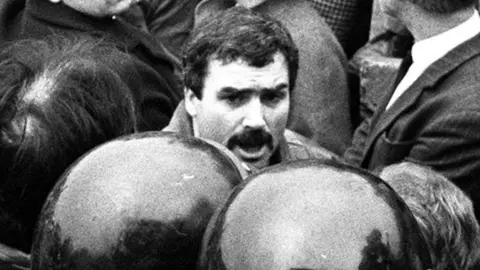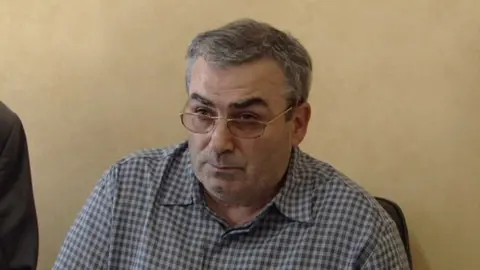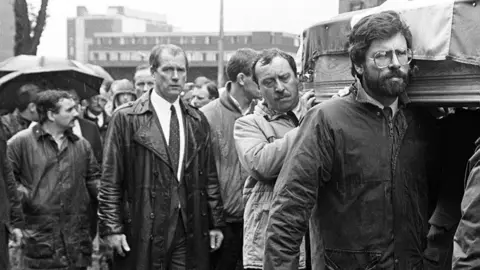Stakeknife: Prosecutors decide not to charge 15 people
 Pacemaker
PacemakerFifteen people , including ex-IRA members and security force personnel, investigated as part of Operation Kenova, will not face any charges.
The £37m inquiry has examined the activities of the Army agent within the IRA known as Stakeknife.
He is widely believed to have been west Belfast man Freddie Scappaticci who died earlier this year.
The Public Prosecution Service (PPS) decisions cover cases including three murders between 1981 and 1993.
It said there is "insufficient evidence" to bring charges.
A significant part of the evidence is intelligence records which they say cannot be used to bring prosecutions.
Victims' families were told of the decisions hours before they were made public on Wednesday.
'Announcement no surprise'
A solicitors' statement issued on their behalf said the PPS announcement came "as no surprise" but added that they had been instructed to request an immediate review of the decisions not to prosecute.
The Operation Kenova investigation began in 2016 under Jon Boutcher, who is now chief constable of the Police Service of Northern Ireland (PSNI).
The head of Operation Kenova, Sir Iain Livingstone, said the 16 people investigated were "supplementary" to the operation's main focus of investigating Stakeknife.

"Kenova considers that we have gathered strong and compelling evidence in relation to that individual. Such evidence has been passed to the PPS and will form the basis of our interim and final reports," he said.
"I understand that for a number of people today's decisions will be disappointing.
"We have spoken to the families affected by these decisions to reaffirm our absolute determination to deliver the truth regarding what happened to their loved ones."
Kevin Winters, who is the legal representative of some of the victims' families, said the decision was "a missed opportunity".
He added that it had taken "over two years in some cases to reach these decisions".
'Insulting to next of kin'
In a statement, he said: "Many people want to know why the decisions could not have been made long before Scappaticci died.
"We have written to the PPS three weeks ago asking for clarification on what they knew about the main suspect's health condition in the lead up to his demise."
Mr Winters also criticised the PPS for declining to identify Stakeknife "as the deceased suspect cited in today's announcement".
"Refusing to name him is nothing short of insulting to the next of kin and ought to be remedied immediately," he added.
 Pacemaker
PacemakerDirector of Public Prosecutions Stephen Herron, said the decisions were taken "carefully, impartially and wholly independently".
In a statement he added: "I acknowledge that today's decisions will be a reminder of the painful and harrowing circumstances of how some Operation Kenova families lost a loved one.
"The challenges in prosecuting legacy cases are well known.
"The events with which these decisions are concerned took place several decades ago and the witness and forensic evidence available was limited.
"A significant body of the material that prosecutors considered included intelligence records.
"It was not possible to use this material in these cases in order to bring prosecutions," Mr Herron concluded.
Following consultation with the families, it was decided not to name the victims in each of the cases, in order to "minimise any potential re-traumatisation".
The PPS said in each of the three murders that took place in 1981, 1987 and 1993 - the victim had been shot as alleged informers by the IRA's 'nutting squad'.
The squad was the internal security unit in which Stakeknife operated while secretly working for the British Army.
A total of seven individuals were considered for prosecution for murder.
Two other suspects were looked at in respect of a case of false imprisonment and conspiracy to murder in 1990.
Six former military personnel were reported over allegations of perverting the course of justice and misconduct in public office.
One of them is an Army lawyer, and one ex-police officer.
The PPS has yet to make decisions on several other elements of the Operation Kenova investigation.
It anticipates doing this "in early 2024".
This story was updated on Friday 8 December to amend the number of people who will not be facing charges following a correction issued by the PPS.
